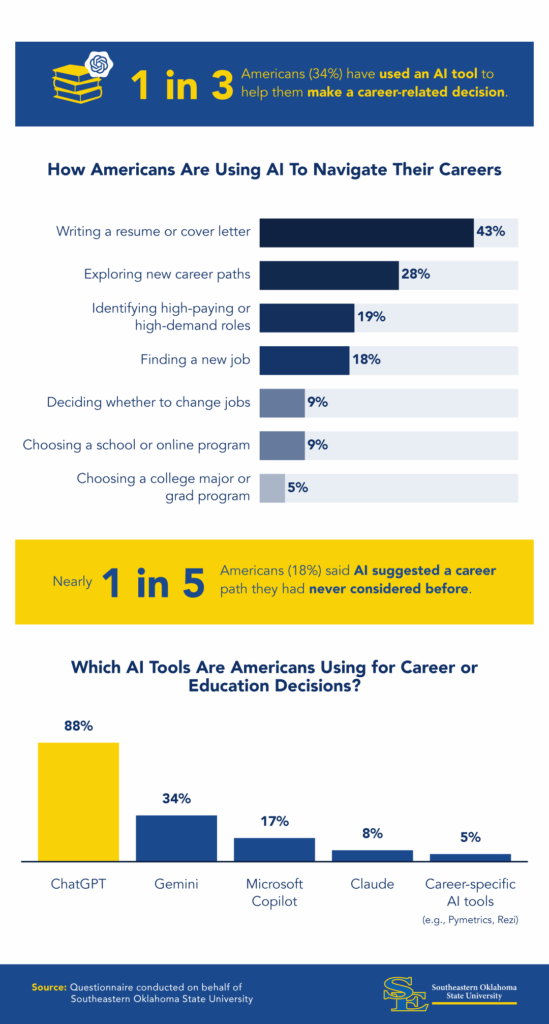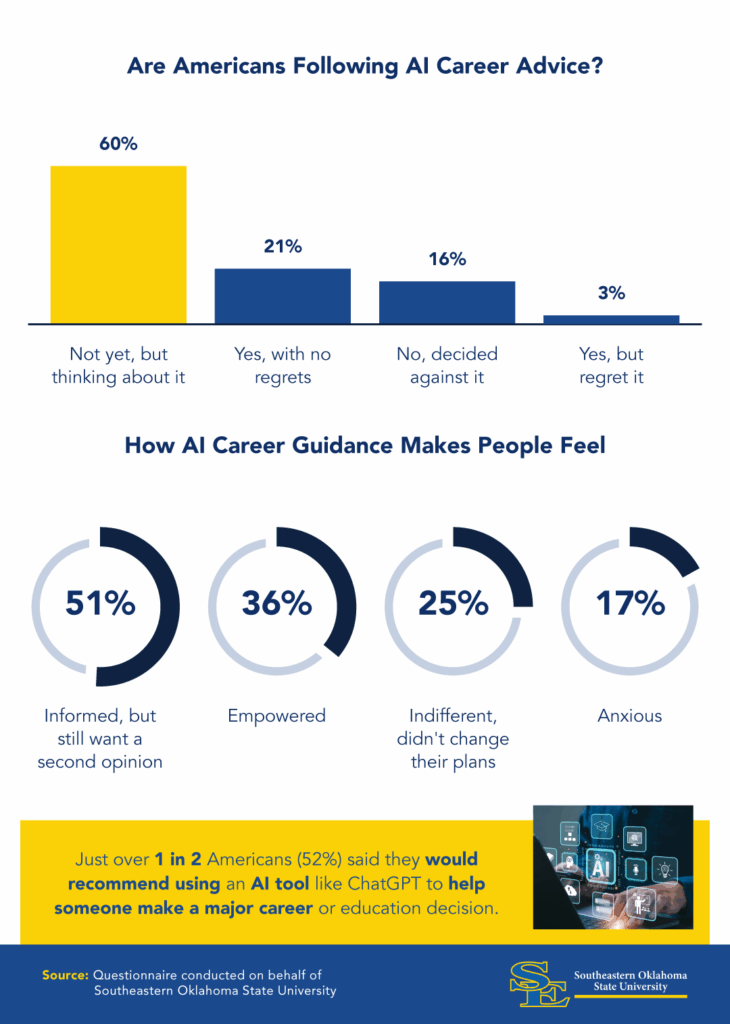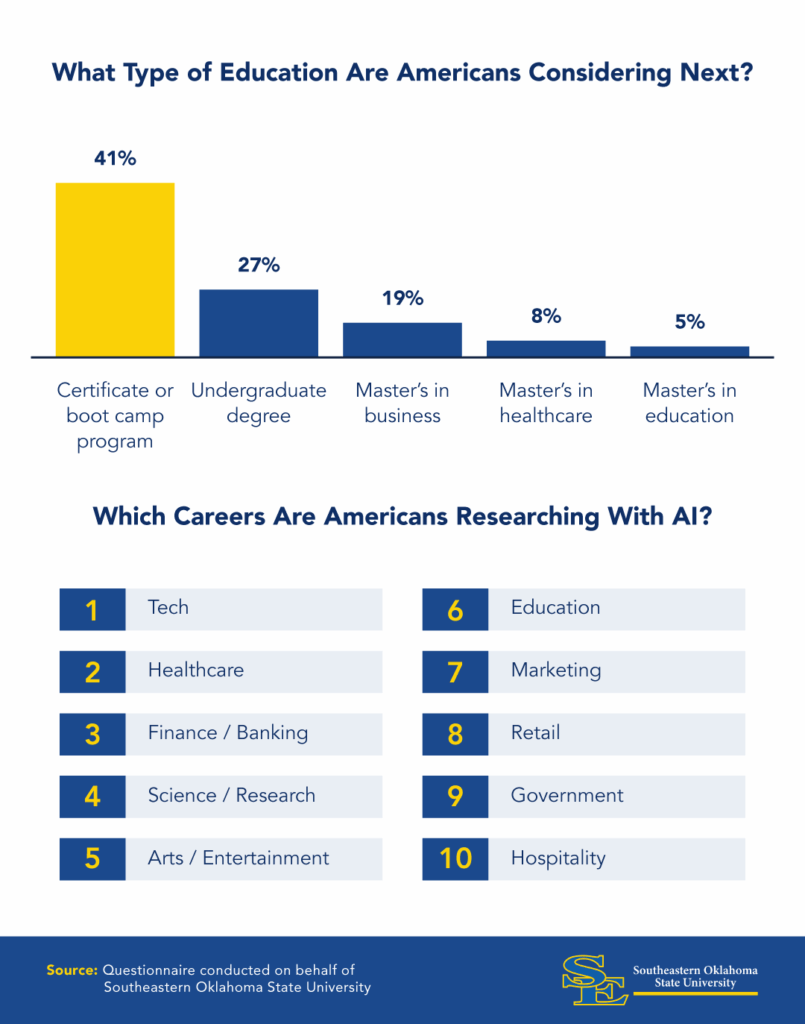![]()
Would you ever ask ChatGPT what your next career move should be? More and more Americans are doing just that. From updating resumes to exploring entirely new fields, AI tools are helping people think through big career moves and even what kind of education they might need to achieve their goals. This article explores the results of a questionnaire of 1,000 Americans to learn how they’re using AI for guidance and how much they really trust its advice when it comes to life-changing decisions.
Key Takeaways
- Over 1 in 2 Americans (52%) say they are currently considering a career or job change.
- 1 in 3 Americans have used an AI tool like ChatGPT to make a career decision.
- Nearly 1 in 5 Americans (18%) say AI suggested a career path they had never considered before.
- 41% of Americans are considering certificate or boot camp programs as their next step in education, followed by undergraduate degrees (27%), then master’s degrees in business (19%), healthcare (8%) and education (5%).
Exploring Careers and Education With AI
Many Americans are thinking about changing jobs, with some turning to AI for guidance. ChatGPT and similar tools are now part of how people explore careers and plan their education.

More than half of Americans (52%) said they are currently considering a career or job change. Generation Z leads this trend, with 57% actively weighing their options, followed by millennials (55%) and Generation X (50%). Only 12% of baby boomers said the same. The industries that could soon see the most movement include marketing, transportation, arts and entertainment, hospitality, and law.
AI tools are playing a key role in these decisions. About 1 in 3 Americans (34%) have used an AI tool like ChatGPT to aid in a career-related decision. Many used it for writing resumes and cover letters (43%), exploring new roles (28%) or identifying high-demand, high-paying jobs (19%). Nearly 1 in 5 Americans (18%) said AI introduced them to a career path they had never considered before.
Interest in additional education is also on the rise. More than half of Americans (54%) were thinking about enrolling in a degree, graduate or certificate program. Gen Z was the most education-focused generation, with 67% considering this path. Millennials followed at 57%, Gen X at 44% and baby boomers at 21%. The most popular fields for continued education include marketing, real estate, tech, transportation, and arts and entertainment.
Gen Z is also leading the way in AI adoption for career guidance. Forty-two percent of them have used an AI tool for this purpose, compared to 34% of millennials, 29% of Gen X and just 23% of baby boomers.
Do People Trust AI Career Advice?
AI tools are gaining traction as career counselors, but trust varies widely depending on the person and the situation.

Just over half of Americans (52%) said they “somewhat” trust AI tools like ChatGPT for career advice. Most people still prefer human advisors, with 60% saying they trust a human expert the most. Only 7% trust AI more, and 24% trust both equally.
When AI and human guidance overlap, it adds complexity. About 36% of Americans said AI and human career advice have matched up at times. Another 32% said they’ve only used human advisors, and 12% rely exclusively on AI tools. Notably, 17% said they’ve followed AI advice even when it contradicted guidance from a human advisor.
Americans are also turning to AI for big-picture decisions, even when the advice isn’t entirely encouraging. Twenty percent said they would still pursue their dream job if AI warned them it had a poor return on investment. Nearly 1 in 4 (24%) said they’d reconsider. The largest group, 41%, said they weren’t sure what they’d do in that situation.
Millennials (54%) and Gen X (54%) were the most likely to recommend using AI tools like ChatGPT for major career or education decisions, followed by baby boomers (48%) and Gen Z (44%).
So, are people following the advice they get from AI? Most are still weighing their options. Here’s how each generation responded:
Gen Z:
- 54% have not yet but are thinking about it.
- 25% followed AI advice and are glad they did.
- 19% decided against it.
- 3% regret following AI advice.
Millennials:
- 61% have not yet but are thinking about it.
- 21% followed AI advice and are glad they did.
- 15% decided against it.
- 3% regret it.
Gen X:
- 62% have not yet but are thinking about it.
- 21% followed AI advice and are glad they did.
- 14% decided against it.
- 2% regret it.
Baby boomers:
- 76% have not yet but are thinking about it.
- 18% decided against it.
- 6% followed AI advice and are glad they did.
What Education Paths Are People Considering Next?
AI tools are influencing more than career changes. They’re also helping people shape their education plans.

Across all age groups, certificate and boot camp programs were the most popular next steps, as cited by 41% of respondents. Others were considering an undergraduate degree (27%) or a master’s degree in business (19%), healthcare (8%) or education (5%). Responses varied by generation as follows:
Gen Z:
- 47%: undergraduate degree
- 22%: certificate or boot camp program
- 17%: master’s in business
- 10%: master’s in healthcare
- 5%: master’s in education
Millennials:
- 48%: certificate or boot camp program
- 21%: master’s in business
- 18%: undergraduate degree
- 7%: master’s in healthcare
- 5%: master’s in education
Gen X:
- 50%: certificate or boot camp program
- 21%: undergraduate degree
- 17%: master’s in business
- 7%: master’s in healthcare
- 6%: master’s in education
Baby boomers:
- 70%: certificate or boot camp program
- 20%: undergraduate degree
- 10%: master’s in business
AI is also helping people explore specific careers. The top three fields researched with AI by generation:
- Gen Z: Tech, Healthcare, Science/Research
- Millennials: Tech, Finance, Healthcare
- Gen X: Tech, Healthcare, Arts/Entertainment
- Baby boomers: Tech, Healthcare, Finance
Over 1 in 10 Americans (13%) have used an AI tool to compare the return on investment of different degrees or programs. These insights are shaping people’s perceptions of the value of education.
AI’s Growing Role in Shaping Life Choices
AI is starting to play a surprising role in some of life’s biggest choices, not just what to have for dinner or how to write an email but also what career to pursue and how to get there. While many still lean on human advisors, a growing number of people, especially younger generations, are listening to what AI has to say. Whether it’s suggesting a new job path or comparing education programs, tools like ChatGPT are quickly becoming part of the decision-making process.
Methodology
Risepoint conducted a questionnaire of 1,000 Americans to uncover how Americans are turning to AI to make life-altering career and education choices. The average age of respondents was 39; 50% were women, and 50% were men. Generationally, 4% were baby boomers, 30% were Gen X, 44% were millennials and 21% were Gen Z. Due to rounding, some percentages in this study may not total 100% exactly.
About Southeastern Oklahoma State University
Southeastern Oklahoma State University offers accessible and affordable online degree programs designed for working adults and career changers. With flexible scheduling and a strong emphasis on student support, Southeastern helps learners at every stage of life reach their educational and professional goals.
Fair Use Statement
This article may be shared for noncommercial purposes only. If you reference or share these findings, please include a link back to this page with proper attribution to Southeastern Oklahoma State University.